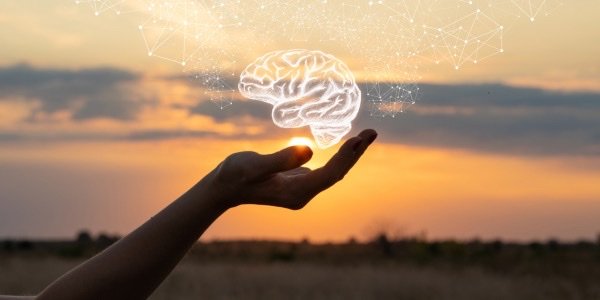A question we hear a lot is “what is the difference between Alzheimer’s and dementia?”. Many people confuse the two, often believing them to be the same thing. As a quick answer, Alzheimer’s is the specific name of the disease, and dementia is the umbrella term that covers the different symptoms of this disease, along with many other diseases. Let’s take a deeper dive below at the difference between the two.
Understanding dementia
Firstly, let’s remember that dementia is actually an umbrella term that describes the symptoms of many different types of Neuro-degenerative diseases. Alzheimer’s disease is one of those, but there are many others, including:
- Vascular dementia
- Lewy body disease
- Frontotemporal dementia
- Creutzfeldt-Jakob disease
- Huntington’s disease
- Posterior cortical atrophy
- Normal pressure hydrocephalus
- Korsakoff syndrome
- Plus, many more
All of these conditions affect the brain and your neurological system differently, although they have enough shared traits to all fall under the category of dementia.
What is Alzheimer’s disease?
Alzheimer’s disease is a disease that causes symptoms of dementia. The two are often confused because Alzheimer’s is the most common form of dementia and perhaps includes the symptoms that most people would identify with dementia, such as memory loss, repeating oneself and becoming disoriented.
Other forms of dementia have their own unique symptoms, causes and treatment options, but Alzheimer’s is very specific. People living with Alzheimer’s experience a range of symptoms that gradually become worse. At this time, there is no cure and no way to slow the process of Alzheimer’s. Eventually, a person with dementia will need full-time care.
The key differences between Alzheimer’s and dementia
Alzheimer’s disease and other diseases with the symptoms of dementia are all progressive brain disorders, and typically they affect people differently. Progression can be slow or fast, and certain functions will likely be affected at different times. These are some of the similarities between Alzheimer’s and other types of dementia, but there are plenty of differences, too.
Alzheimer’s is just one type of dementia
Perhaps the biggest difference is the very definition. Alzheimer’s disease is a specific form of dementia. There are numerous other forms of dementia, with Alzheimer’s being just one of them. So, Alzheimer’s has very specific symptoms, causes, methods of diagnosis and expected outcomes. This is just like every other form of dementia that has its own unique characteristics.
While it may be common for the general public to often interchange the terms, “Alzheimer’s” and “dementia”, it isn’t technically correct.
Symptoms vary
A major difference between the two is the fact that Alzheimer’s disease has a specific set of symptoms. While the experience is different for everybody, some symptoms can include:
- Repeating the same thing
- Frequent short-term memory loss
- Difficulties in your ability to plan, solve problems and think logically
- Difficulties with language and comprehension
- Often becoming disoriented regarding time and places
- Mood and personality changes
- Taking longer to perform daily tasks
It’s important to note that many of the above symptoms can indicate other forms of dementia, too. Alzheimer’s is still its very own, unique condition, but the symptoms may cross over with other diseases that too have the symptoms of dementia.
Other forms of dementia may have symptoms such as difficulty interpreting images, loss of bladder control, problems walking or uncontrollable limb movements. It is possible for people to be diagnosed with a form of mixed dementia, where multiple types are present. However, in general, people with Alzheimer’s will have a different experience from those with other dementia types.
The causes of Alzheimer’s
Once again, being a standalone condition, there are more specific things that cause Alzheimer’s. While it isn’t common, some people experience familial Alzheimer’s, which occurs due to a gene mutation. In most cases, though, it develops for largely unknown reasons. The best information to date indicates that lifestyle factors are the major causes of Alzheimer’s, including:
- Smoking/tobacco use
- Drinking alcohol
- High cholesterol
- High blood pressure
- Diabetes
- Obesity
- Lack of physical and mental exercise
As you can see, these are very specific causes. Obviously, these types of lifestyle factors can lead to many health problems, even other types of dementia. However, experts have already determined that other types of dementia have their own specific set of causes. Some types of dementia are caused primarily by alcohol misuse. Others are mostly genetic. Some are caused by head injuries or trauma.
Diagnosis of Alzheimer’s
Scientists have been able to identify that countless biological processes occur inside our bodies every day. They can also isolate the cellular activity that causes many types of dementia. For example, Huntington’s Disease is a form of dementia that can be identified genetically. Vascular dementia is diagnosed when there has been one or multiple strokes. It sounds complex, but another form of dementia, Creutzfeldt-Jakob Disease, is caused by the folding of a certain type of protein in our bodies.
When diagnosing Alzheimer’s, experts will consider medical history, view brain scans, conduct blood and urine tests, perform physical and psychological assessments and even conduct neuropsychological testing. If the specifics of Alzheimer’s are met through testing and other conditions are ruled out, it can then be diagnosed.
If you or a loved one are experiencing symptoms of dementia and you need support, please contact Group Homes Australia today.






0 Comments